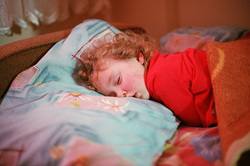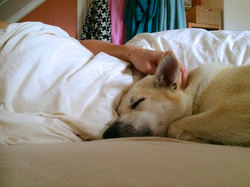
The good news is, there is a cure. And best of all, the cure is totally free!
The bad news is, despite the "cure" being free, readily available, and around since time began, more and more people are affected by this deadly health problem every day. Don't be one of them! Here's how this problem affects you, and how to solve it.
As children, we are great at sleep. We can fall asleep just about anywhere, anytime, sleep deeply, and wake well-rested and ready for action. We don't lie awake worrying about falling asleep. And we certainly don't set our alarms half an hour early and guiltily hit the snooze button 10 times. "Sleep like a baby" may seem laughable to any new mom, but the truth is, once we pass those few fitful new baby months adjusting to the external world, we've got a number of years of great sleep ahead of us - and we take advantage of them!
I remember the love of sleep from very young - that completely relaxed state you fall into when you really have no real worries to speak of. I remember falling asleep in my dad's truck on the way home from somewhere, and waking up - just barely - being carried into the house - not even bothering to lift my head - completely relaxed and limp with the total security of my father's arms supporting me.
How often do we sleep like that as adults, with all our worries and cares and busy schedules? Somewhere along the way, we lost this ability, and our health is suffering as a result.
What Happened to Sleep?
In 1879, an event occurred that forever changed the world - or at least the way humans live in it. With one important invention, Thomas Edison brought light to darkened homes everywhere, and the world woke up. Rather then sleeping when the sun went down (or not long afterwards), humans now stayed awake for hours into the night. Stores and businesses were able to stay open after dark. And industry boomed.
Before 1879, the average American slept about 10 hours per night. On average!
Today, we sleep an alarming average of 6.7 hours per night.
Is it any wonder we are a nation of grumpy, stressed out, unproductive, overworked, and exhausted individuals?
According to Sara Mednick's fascinating book, Take a Nap, Change Your Life*, "We are a nation of the walking tired, so much so that 51 percent of the workforce reports that sleepiness on the job interferes with the volume of work they can do."
But that's not the worst of it. Lack of sleep affects more than just your mood and your productivity.
After all, as Sara says, "After air, food and water, sleep is the most critical necessity for maintaining the body’s vital organs and systems."
In fact, many studies have found that lack of sleep is associated with increased risk of breast and colon cancer. It also disrupts many of our bodily systems, including hormones that regulate appetite, which is why inadequate sleep is a major contributor to our country's epidemic of obesity. Yet, you don't hear much about this in mainstream medical news - probably because, well, some of us kind of pride ourselves on how little sleep we can get by with!
I remember a lady that I worked with a few years ago bragging about how she never needed more than 5 hours of sleep a night. I was aghast at the thought; if I get less than 8 I feel like a zombie! But I've learned that telling people I need at least 9 hours gets me some very skeptical and almost indignant looks, as though it were something to be ashamed of. Until I heard about Sara's book - that is.... Now I don't feel like such a weirdo! :-)
Sleeping is absolutely imperative for proper brain and bodily function. As I've mentioned, lack of sleep has numerous health risks, but in case you're not convinced yet, here are just a few more symptoms of not getting enough of it:
- Decreased alertness & impaired motor skills
- Impaired decision making & ability to focus
- Increased stress levels
- Impaired memory
- Lowered creativity
- Weight gain
- Decreased energy and stamina
- Lowered sex drive
- Increased risk of heart attack & stroke
- Increased risk of diabetes
- Increased incidence of depression
- More frequent migraines, ulcers, and other stress-related illnesses

You may, in fact, be thinking right about now, "Hey, I'm not that sleep deprived. I get 7 hours and I feel fine!" But the scientific reality is simple: If you need caffeine to get through your day, you’re sleep deprived. Period.
Fortunately, the solution is equally simple. Sleep more.
But in a world of 24-hour drive through's, third-shifters, and all night cable TV marathons, the reality isn't always that easy.
One thing you can do - or at least try to incorporate a bit more of - is napping.
Actually, interestingly enough as Sara discusses in her book, we are the only animal species that tries to get all of its rest in one contiguous block of time. All other animals nap sporadically throughout the day.
Humans historically have done so too. In ancient Rome, noon was set aside as a time period known as "sexta," when everyone would come in from the fields and take a mid-day nap. (This is where we get the modern term, "siesta.") As Sara says, "For most of our history, a rest during the day was considered as necessary a component of human existence as sleeping at night."
In fact, midday naps were common throughout Europe before the Industrial Revolution, but they slowly began to disappear as the well-engineered clock allowed for more precise scheduling and we all started living our lives according to its pace rather than our own natural rhythms.
As always, when we mess with our natural rhythms that God gave us to live by, we pay for it. Sometimes we pay with our health, and sometimes we pay in ways we don't even really think about, as Sara also talks about in her book:
"Once the nation with the most productive workforce in the world, the United States, by a number of measures, has fallen behind countries such as France and Germany. Our standard of living is slipping. Our students are underperforming. Our collective health is deteriorating. In areas such as science and technology, we no longer dominate. Politicians, pundits and experts from all fields have made an industry out of explaining what’s going wrong. But continually overlooked is the role of that quiet little demon: fatigue."
- Sara C. Mednick, Take a Nap, Change Your Life!
Along with napping whenever you are able, you will also want to optimize your nightly sleep as well. Here are some tips for making the most of your sleep time:
- First, determine how much sleep you need per night. According to Dr. James Maas in his book, Power Sleep, "At minimum most people absolutely need to obtain at least sixty to ninety minutes more sleep than they presently get." The right amount of sleep for you is whatever you need to get to be fully alert all day long - with NO coffee or other caffeine or stimulants. For me it's about 9 hours.
- Then, establish a calming routine before bed - and do it every night. A consistent routine helps prepare your mind and body for sleep.
- Minimize caffeine or other stimulants once evening approaches, if not before.
- Shut off digital stimulation an hour or two before sleeping
- Quiet activities such as taking a bath, listening to soothing music, or reading a book can all help the body as well as the mind to settle.
- Go to bed at the same time every night, and wake up without an alarm clock at the same time every morning, including weekends. Regularity is important for setting and stabilizing your internal sleep-wake clock.
There you have it! A "prescription" for better health, less stress, more enjoyment of life, and overall well-being. Best of all, it’s free, nontoxic, and has no dangerous side effects. :-)
As Dr. Maas says in Power Sleep, "We do not understand the need for sleep and the consequences of sleep deprivation. We must learn to value sleep as much as we value the importance of proper nutrition and exercise."
Although most of what you read about health probably is more about nutrition and exercise, sleep is just as important!
That's why I wanted to bring it to your attention today, and I hope you take it to heart, and acknowledge the fact that sleep is one of the BEST natural resources available for helping you create a happier, healthier, more holistically balanced life!
Now go take a nap! :-)
Rose.
* Thanks to Brian Johnson of Philosophers Notes for introducing me to this great book - and sharing information on this important topic!



 RSS Feed
RSS Feed